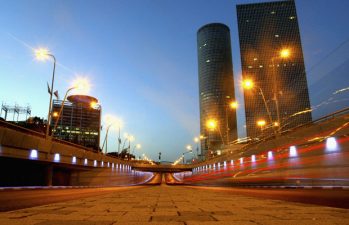 Karin meets Prince Hassan of Jordan at a water security conference in Switzerland last week.
Karin meets Prince Hassan of Jordan at a water security conference in Switzerland last week.
It was a meeting of minds, water minds. Water consultants, ambassadors who’ve built water treaties, and government specialists and negotiators from around the Middle East and Europe gathered in Montreux, Switzerland for a two-day workshop on Water Security in the Middle East last week. Green Prophet was invited to attend. The object was to explore sustainable and cooperative solutions to water security, and to use the problem of water and turn it into an instrument of peace.
Organized by the Strategic Foresight Group, the same India-based firm that brought us the Cost of Conflict to the Environment in the Middle East report, the event included a gala supper, and meeting with the Prince of Jordan, sponsored by the Swiss and Swedish governments. Both peace-loving and humanitarian nations are eager to ease future conflicts in the Middle East, with all fingers pointing to water conflict being the fuel for the next big one, many believe. But how can it be done?
The second day workshop, which I was invited to attend (and presented my interviews with Israeli water experts), included a panel of Palestinians, Turks, Israelis, and Jordanians, and officials from Ireland, Switzerland and Sweden, India and Syria who helped moderate.
Before the long day of talks, we met for cocktails and supper at the Montreux Palace Hotel. We were in great company: previous guests to the hotel include Deep Purple (whose fan burned down the Montreux Casino), Led Zeppelin, Freddie Mercury, and and Dostoevsky. It was a venue fit for a king, or at least a prince.
 After some small talk with that day’s workshop (from Iraq, Lebanon and more), we all greeted Prince Hassan bin Talal, the Prince of Jordan, and a voice for global sustainability, reconciliation and interreligious understanding, graced us with his presence, along with his wife Sarvath last Monday.
After some small talk with that day’s workshop (from Iraq, Lebanon and more), we all greeted Prince Hassan bin Talal, the Prince of Jordan, and a voice for global sustainability, reconciliation and interreligious understanding, graced us with his presence, along with his wife Sarvath last Monday.
He talked about the problems of global warming, and the impact it will have on humanity.
“When Al Gore talked about global warming, I talked of human warning,” said Prince Hassan, who pointed to the Balfour Declaration signed 90 years ago, as the as the start of conflict between Israel and the Palestinian Arab people. In the context of water, “Territory migration is the conflict we face,” he said.
Possible solutions?
Prince Hassan talked about developing the earthquake prone Jordan Rift Valley, and how the region needs a “master plan for water management. We need to go from concept building to a new concept,” he addressed, adding it was time to mobilize the “silenced majority.”
“War does not make additional water, but regional cooperation can… There is an urgent need for developed countries to provide technical assistance and support to water poor countries to reach a better level of water safety,” he said.
“Our challenge in this part of the world is to come to terms with the international inconsistency and double standards to which we find ourselves subjected year after year. We have had enough of being the subject of development policies. We would like to become the object of development,” he added.
Jordan is one of the most resource-poor countries in the Middle East, but a moderate that can help broker peace between Israel and the Palestinian Authority. The Prince sees the following avenues open to explore new channels in fulfilling water supply and demand in the region:
He mentioned the significance of Desertec – a pan-European, pan-African solar project that will collect solar energy from North Africa and pipe it to Europe, and the need for other countries in the Middle East to be involved in the project.
He talked about the potential of freshwater reserves from the Nile region in Egypt, and reminded us about the Dead-Red canal, and the project’s potential to bring water and energy to the resource strapped region.
Prince Hassan pointed out the value of surface water, especially for the Palestinians in Gaza, as a means for obtaining more freshwater, explored Jordan’s advancing technologies in nanotechnology to remove pollution from water; and Jordan’s interest in turning the clay-based deserts into arable farmland while pointing out the role the IUCN, the International Union for Conservation of Nature, should play in the Middle East.
When I met him I promised to make sure that Jordan gets even and fair coverage of its environment news and breakthroughs; and he said he’d be happy to help in any way he could.
Facing the waters of Lake Geneva, held by mountains on both sides, the night provided a safe and secure meeting ground for us to listen to Jordan’s concerns, which were all of our concerns; we later heard from Swiss and Swedish governments; and how the Swiss and French worked to turn Lake Geneva into a clean cross-boundary water resource now enjoyed by millions.
We went to bed with our bellies full of Swiss delights –– chocolate and cheese –– with high hopes for the next day’s workshop. Stay tuned for my updates.



Combining ancient and modern knowledge, the Green_Prophet’s_Philosophy will overcome the Middle_East_Water_Problems very soon. — At first the ancient version, taken from the Bible (OldTestament 5Mose 11, 13-21)
So if you faithfully obey the commands I am giving you today — to love the LORD your God and to serve him with all your heart and with all your soul — then I will send rain on your land in its season, both autumn and spring rains, so that you may gather in your grain, new wine and oil. I will provide grass in the fields for your cattle, and you will eat and be satisfied.
Be careful, or you will be enticed to turn away and worship other gods and bow down to them. Then the LORD’s anger will burn against you, and he will shut the heavens so that it will not rain and the ground will yield no produce, and you will soon perish from the good land the LORD is giving you. Fix these words of mine in your hearts and minds; tie them as symbols on your hands and bind them on your foreheads. Teach them to your children, talking about them when you sit at home and when you walk along the road, when you lie down and when you get up. Write them on the doorframes of your houses and on your gates, so that your days and the days of your children may be many in the land that the LORD swore to give your forefathers, as many as the days that the heavens are above the earth.
And now the modern version, taken from meteorological sciences.
To produce more rain in arid zones it is necessary to take care that more moisture is transported by the winds than normally. That is easily done by technical means. Evaporation of seawater by spraying tiny drops into the air there, where the wind blows into the land will do the job on hot days, leaving the salt behind. Ideal geography is the Suez Canal, the coasts of Red Sea, the Horn of Africa etc.
Each ton additionally evaporated water will come down within few days as fresh water rain far off the coast line. The cost per ton is about 1 Euro-Cent.
This is incredible. Karin, you do all of us GPs proud!